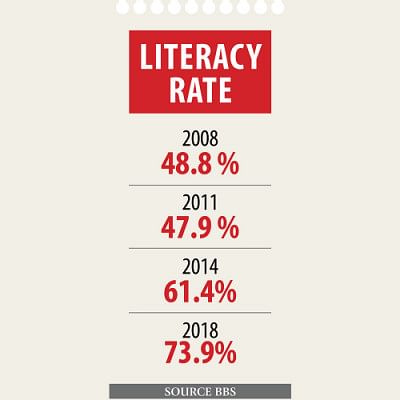100pc literacy still a far cry

Around 26 percent of adults in Bangladesh are still illiterate though the ruling Awami League in its 2008 election manifesto had promised to eradicate illiteracy from the country by 2014.
The National Education Policy 2010, framed by the AL-led government in 2009, also set a similar target of ensuring 100 percent literacy by the same timeframe.
But the literacy rate for people aged 15 and above stands at 73.9 percent, shows Bangladesh Sample Vital Statistics 2018 released by Bangladesh Bureau of Statistics in May.
The rate was 48.8 percent among the same age group in 2008, according to BBS Literacy Assessment Survey 2008.
Educationists have blamed absence of proper planning, lack of will and financing as well as incapacity of implementing agency Bureau of Non-Formal Education (BNFE) for the failure to eradicate illiteracy.
They have also pointed out little interest among donors in financing literacy projects because of mismanagement in the previous projects.
“Donors hardly show any interest in financing the initiatives for reducing illiteracy due to mismanagement in previous projects,” said Manzoor Ahmed, professor emeritus at BRAC University.
He further said, “The government didn’t take proper initiatives to achieve the target.”
“Bureau of Non-Formal Education is a weak organisation, and its officials lack skills. But no change was made in the organisation for achieving the target,” noted Manzoor.
Against such a backdrop, the country will observe the International Literacy Day tomorrow.
Talking to The Daily Star, several BNFE officials said that though the AL government pledged to eradicate illiteracy by 2014, it failed to take up any project under the bureau until 2014 to further bring down the illiteracy rate.
The AL-led government in 1997 took up a major project titled “Total Literacy Movement” with state fund of Tk 682.9 crore. And the implementing agency was the Directorate of Non-Formal Education, they said.
But in 2003, the then BNP government discontinued the project over allegations of irregularities. It even dismantled the Directorate of Non-Formal Education and transformed it into the BNFE in 2005.
The BNFE didn’t take up any major programme with focus on reducing illiteracy during the tenure of the BNP-led government.
Assuming power in 2009, the AL-led government planned to take up two Tk 3,000-crore projects and sought assistance from donors. But it had to shelve the projects as none of the donors agreed to fund those, said the officials.
In 2014, the AL government took up a Tk 453-crore project under the BNFE with its own funds to make literate 45 lakh people aged between 15 and 45.
Experts say the government failed to achieve its goal due to a lack of long-term and sustainable planning in non-formal education and resource constraints for adult literacy programmes.
“Adult literacy didn’t get due importance in terms of planning and financing,” said Executive Director of Campaign for Popular Education Rasheda K Choudhury.
Expansion of formal education played a vital role in the increase in literacy rate for adults in the last 10 years, she said.
“The government activities were solely project-based, which implies that all activities under a project ended when its timeframe expired.”
Programmes should be taken up, considering the socio-economic realities, Rasheda suggested.
Primary and Mass Education Secretary Akram-Al-Hossain and BNFE Director General Tapan Kumar Ghosh said they had no problems with planning.
“Eradication of illiteracy is a continuous process. We have made some progress. The literacy rate has reached 74 percent… Isn’t it a success?” Akram asked.
He said they are now shifting from short-term projects to long-term programmes.
“We have finalised the Non-Formal Education Development Programme in line with the Sector Wide Approach,” he said.
Seeking anonymity, a top BNFE official told this newspaper that they have one office with only three staffers in every district to run literacy programmes.
“At least 20 posts of assistant director[the chief of BNFE office at the district level] are vacant now… Besides, we don’t have any office at the upazila level,” said the official.
Asked, Akram said his ministry has taken an initiative to set up BNFE offices in upazilas across the country.
He further said they already got approval from public administration and finance ministries in this regard. The proposal will soon be sent to the Cabinet Division for approval.
“We have some plans. Illiteracy rate will drop rapidly in the next five years.”
Akram said they already took up a project to make another 21 lakh people literate by 2020.

 For all latest news, follow The Daily Star's Google News channel.
For all latest news, follow The Daily Star's Google News channel. 








Comments